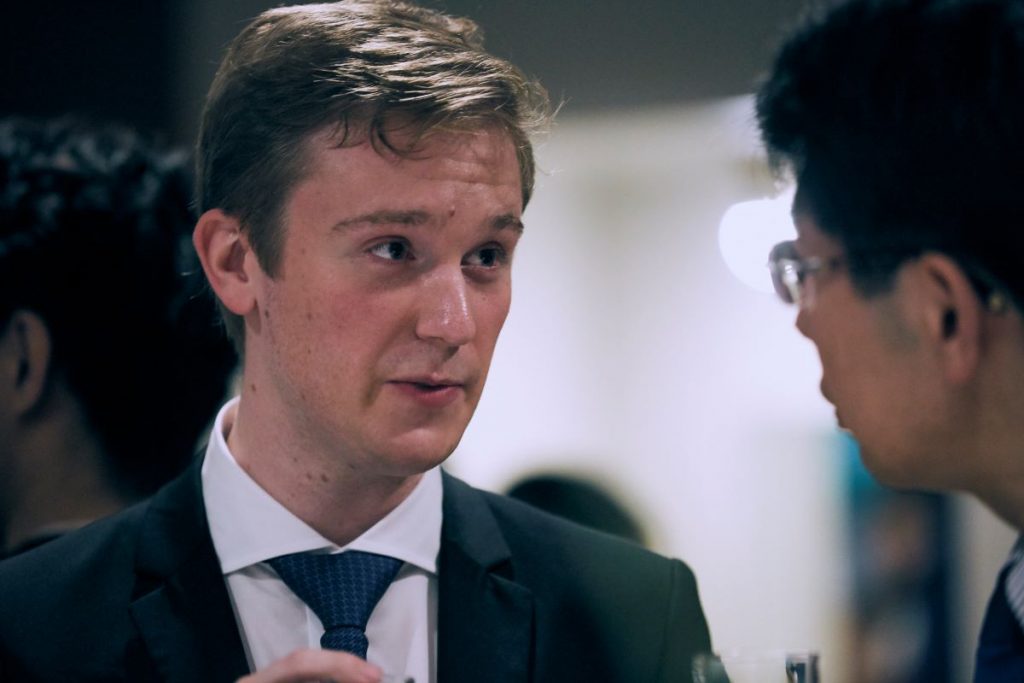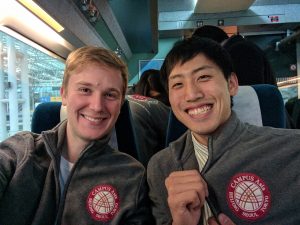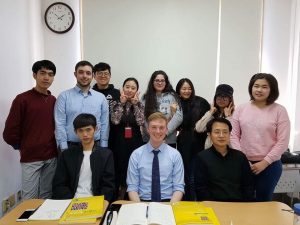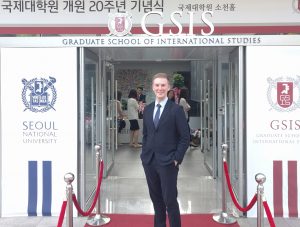What was your motivation to enroll in GraSPP?
My academic path has been somewhat unconventional as I had already been enrolled in another graduate school at the University of Tokyo before GraSPP for an exchange semester. At that time, I was exploring new interests and considering a career in diplomacy, while also planning to settle in Japan. I was fortunate enough to audit some classes from other faculties, including GraSPP. One such course was Japan’s East Asia Policy by Professor Hitoshi Tanaka, as well as other classes offered through the Japan-Asia Studies Program. Those encounters were fundamental in my decision to enroll in GraSPP one year later.
After a series of interviews, I had the honour of being accepted as an incoming student in the MPP/IP program for the class of 2017. While my career has taken a different direction, I would not be where I am today without my transformative experience at GraSPP.
If you are an international student seeking a world-class education in Japan at the intersection of public policy and economics, in both English and Japanese, or if you are aiming to accelerate your career with a focus on East Asia, there very well may be no better choice than GraSPP.
What was attractive or stimulating about GraSPP?
The multidisciplinary approach of the program, together with the breadth of subjects covered by a combination of core and elective courses is the main strength of GraSPP in my opinion.
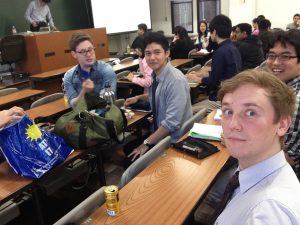 Together with the ability to audit classes outside of my primary areas of research, this environment allowed me to build a unique curriculum tailored to our individual needs and interests. While the core courses in microeconomics, statistics, and macroeconomics were the cornerstone that provided me with the fundamental knowledge and tools to analyse today’s economic environment, it is the elective courses that allowed me to apply those frameworks to real-life challenges in the field of public policy and beyond. Professor Nishizawa’s Public-Private Partnerships course is one example of such practical lessons that I still refer to in my current work.
Together with the ability to audit classes outside of my primary areas of research, this environment allowed me to build a unique curriculum tailored to our individual needs and interests. While the core courses in microeconomics, statistics, and macroeconomics were the cornerstone that provided me with the fundamental knowledge and tools to analyse today’s economic environment, it is the elective courses that allowed me to apply those frameworks to real-life challenges in the field of public policy and beyond. Professor Nishizawa’s Public-Private Partnerships course is one example of such practical lessons that I still refer to in my current work.
In sum, GraSPP offers a fantastic balance of theory and practice between academic excellence and hands-on application.
Please share your memorable experiences/courses in GraSPP
During my time at GraSPP, I took a wide range of courses trying to immerse myself in diverse research ideas from the world-leading faculty and ubiquitous course offerings. I followed classes in macroeconomics, microeconomics, supply chain management, statistics, political science, international relations, geopolitics, governance, social economics, energy sovereignty, food security, and more.
While it may sound like a mere enumeration without head or tail, I firmly believe that this abundance of opportunities and courses is where GraSPP really shines, allowing each student to freely explore new ideas and topics and pursue their own interests through a tailor-made curriculum within the realm of public policy and beyond.
A blessing to an inquisitive mind, that freedom to discover various disciplines shaped the passionate generalist that I am, and has had a lasting impact on my approach to work and life till this very day.
Of course, my experience at GraSPP would not have been complete without my exchange semester at Seoul National University, where I had the privilege of joining CAMPUS Asia students. There, I experienced another truly multicultural academic environment, with opportunities for international cooperation on campus and outside, thanks to the many activities and travels, including memorable trips to Daegu and Busan, organised by the GSIS faculty staff.
At SNU, I focused on South Korean contemporary history and social studies, as well as intensive Korean language classes. It was a perfect complement to my courses at GraSPP and allowed me to deepen my understanding of Japan-South Korea international relations and comparative economic development – topics that are still very close to my heart today.
What has GraSPP meant to your life?
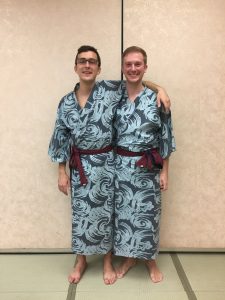 My time at GraSPP was undoubtedly instrumental in my decision to stay in Japan and begin my professional life here. Not only did it give me the credentials to kickstart my career in Japan thanks to the prestige and immaculate reputation of the University of Tokyo, but it also fostered an intellectually stimulating and international environment.
My time at GraSPP was undoubtedly instrumental in my decision to stay in Japan and begin my professional life here. Not only did it give me the credentials to kickstart my career in Japan thanks to the prestige and immaculate reputation of the University of Tokyo, but it also fostered an intellectually stimulating and international environment.
It nurtured a network of bright and passionate individuals, many of whom I have had the privilege to call friends. Though we now lead different lives, many alumni, Japanese and international alike, have decided to settle in Japan after graduation.
I am always surprised to see how frequently I run across fellow GraSPPers at work and outside, and how we continue to support and uplift one another, bonded by shared memories that will last us a lifetime.
Did the school life at GraSPP affect your career?
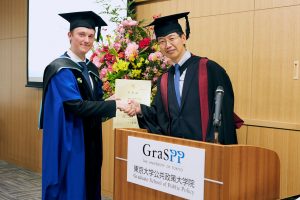 After graduation, I held various positions at several investment banks in Japan, initially in Multinational Coverage before joining the Structured Finance division, until my current position as senior auditor for the General Inspection, covering the Asia-Pacific region.
After graduation, I held various positions at several investment banks in Japan, initially in Multinational Coverage before joining the Structured Finance division, until my current position as senior auditor for the General Inspection, covering the Asia-Pacific region.
Albeit far removed from the sphere of public policy, I am constantly grateful for the many opportunities to apply the knowledge and skills I gained at GraSPP – whether in terms of negotiation tactics, governance, diplomacy, analytical skills, intercultural communication, not to mention intellectual rigour and integrity.
Any advice or comments for prospective or incumbent students?
At the risk of stating the obvious, I truly believe that GraSPP is what you make of it, and will only take you as far as you are willing to go. That freedom of choice is reflected in the diversity of careers and professions embraced by GraSPP alumni. Whether as public servants or private sector employees, be it in the fields of diplomacy, politics, public administration, energy, research, journalism, consulting, finance, lobbying, recruiting, or within intergovernmental organisations, NGOs and think tanks, there is no sector or region where you will not find GraSPP alumni making a difference and building tomorrow’s world.
 I would like to take this opportunity to thank my fellow students for making my experience at GraSPP so memorable. The friends you make today will become your network tomorrow, and your greatest asset. So, take every opportunity to engage with your fellow students – odds are you will meet inspiring and passionate individuals and, most likely, lifelong friends. (Also, don’t forget to join the GraSPP Alumni Association!)
I would like to take this opportunity to thank my fellow students for making my experience at GraSPP so memorable. The friends you make today will become your network tomorrow, and your greatest asset. So, take every opportunity to engage with your fellow students – odds are you will meet inspiring and passionate individuals and, most likely, lifelong friends. (Also, don’t forget to join the GraSPP Alumni Association!)
I also wish to express my gratitude to my professors for their availability and guidance. As a student, your curriculum at GraSPP is what you make of it – so challenge yourself, explore new ideas, and step outside of your comfort zone. When in doubt, do not hesitate to consult with your professors, they will always be there to support you and provide invaluable advice.
And last but not least, to the International Affairs office staff: thank you for helping me navigate the bureaucratic intricacies of Japanese administration as a foreign student, and for your unwavering support whenever I faced hardships during my time at GraSPP, whether academic or personal. For prospective students, please be assured that you will be in the very best hands possible.
Be daring, believe in your aspirations, and get ready to embark on the best chapter of your life at GraSPP!



